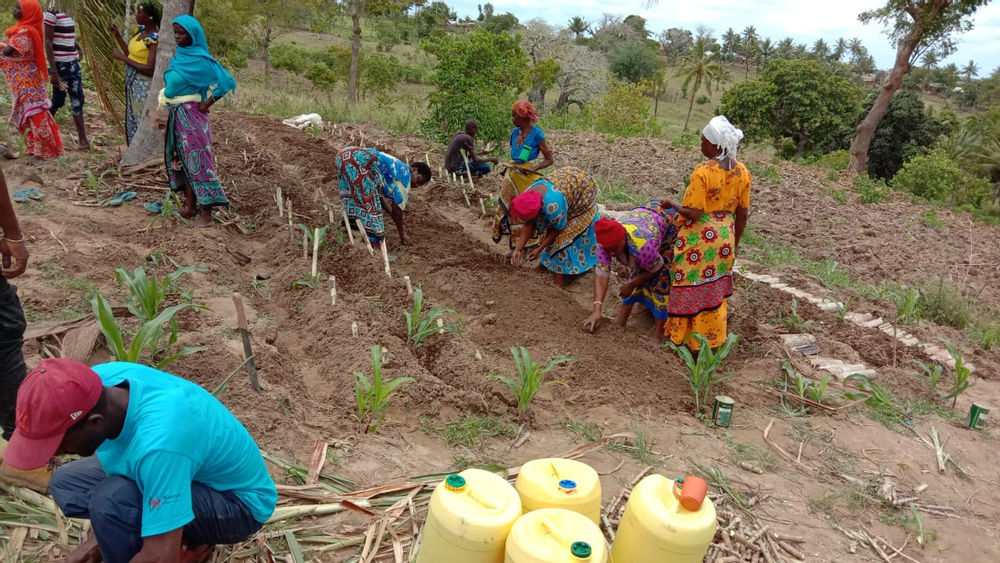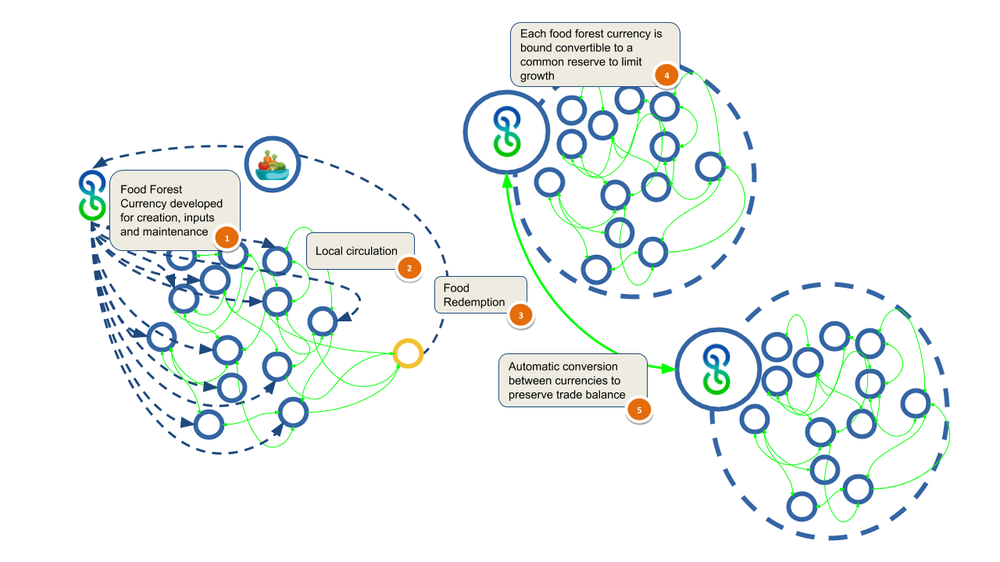Food Forests and Syntropic Currencies

Having worked on a myriad farming techniques, I’ve never been more inspired by the practicality and theory behind Syntropic Agroforestry. Regenerating soil while practically providing crops and long term food forests is actually possible!
We’ve had the pleasure of hosting Roland van Reenen from Curacao and sent to us by Curadao.
He is convinced that food forestry via Syntropic Agroforestry will solve most of our fundamental crises and works with the government of Curacao on regenerative organic agriculture programs. Above you can see a group of Kenyan farmers taught agroforestry by Roland, who are also using Community Inclusion Currencies (CICs) here in Kenya to fund themselves to develop the food forest. If these few demo plots produce as much food as similar plots in Curacao (a drought stricken island with only half the annual rainfall of Kenya), we will have a grassroots revolution underway.
Some core syntropic principals:
- Ensure Soil is covered: so that water and nutrients don’t evaporate and that roots and mycorrhizal fungi can absorb and move around those nutrients. (Don’t even step on bare soil).
- Maximize Photosynthesis: plants requiring different amounts of sunlight can be planted above, below and around each other to ensure that sunlight isn’t wasted on the soil and at least twice the amount of energy can be consumed by plants.
- Succession: Ensure that there is a clear succession of plants. E.g. As a cassava grows it can give shelter to a fruit tree.
- Stratification – Fill each layer of vegetation and maintain diversity for system health. Space (stratification) has to be harmonized over time (life cycle), respecting the successional steps within each of the systems
- Management – Keeping balance, reducing excess growth.
Using community currency to budget for the creation and maintenance of food forests seems as natural as the syntropic principals themselves. Indeed the circulation of community currency mirrors the concepts of mycorrhizal association and hyphal networks. “In some more complex relationships, mycorrhizal fungi do not just collect immobilized soil nutrients, but connect individual plants together by mycorrhizal networks that transport water, carbon, and other nutrients directly from plant to plant through underground hyphal networks.”
In this sense CICs connected through membranes (bonding curves) enable communities to transport vital resources. Further a CIC is a voucher for a particular group of resources identified by a village. One can hardly think of a better source of primary production than the food from a food forest being the anchor (backing of last resort) for a community currency.
Syntropic Agroforestry is the best candidate I have seen for regenerating rich soil, and developing sustainable fertile crops in a way that can be integrated into traditional farming here in Kenya. This could be the carbon sequestration, water harvesting and food system we need to heal our ecosystems. I’m excited that community inclusion currencies could be the way to both fund their development, maintenance – but also that these food forests establish a solid basis for the intrinsic value for currencies.
We don’t have to stretch far at all to apply syntropic principals to a community currency and networks of community currencies. Syntropic principals loosely applied to community currency:
- Ensure basic needs are covered: Using anything but community currency for basic needs creates a dependency on foreign currencies or aid.
- Maximize resources: The benefits of foreign and local resources are best consumed by an entire supply chain in order to produce local productive capacity. Ensure a community currency is being utilized by each level of production, services and value addition.
- Succession: Ensure that there is a clear succession of community currency utilization. We often call this braiding: as the usage for CC among trade for food, moves into education, and haircuts and so on.
- Stratification: Ensure a diversity of usages for Community Currency - any gaps in diversity can lead toward extraction of local resources and eventual stagnation..
- Management: Ensure that the growth of a Community Currency is clearly bounded and its supply and value can’t keep growing forever. When CC accumulates and stops flowing or dissipates into another ecosystems, management is key to regain healthy flow.

In the above diagram, a community inclusion currency issued (1) based on needed inputs and labor for a food forest and circulates locally among diverse local users and (3) can be redeemed for the food produced. These food forest based currencies can hold a common reserve (4) which limits their growth and (5) allows them to connect to other communities.
We're excited to be adding this key component to anchor the flow of rural community currencies - and for what it may mean for food security and environmental restoration! Very appreciative to Roland and Curadao for spreading these systems far and wide!
Here is a simple illustrated handbook for Syntropic Agroforestry
Syntropic agroforestry handbook


